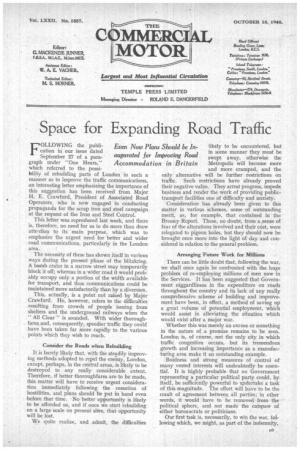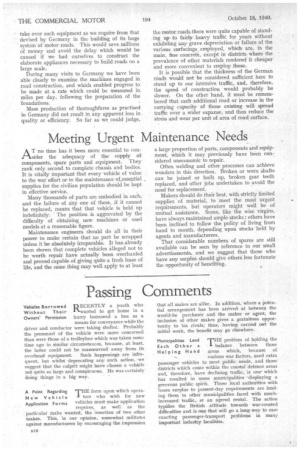Space for Expanding Road Tra ffic F OLLOWING the publication in our
Page 43

Page 44

If you've noticed an error in this article please click here to report it so we can fix it.
issue dated September 27 of a paragraph under "One Hears," which referred to the possibility of rebuilding parts of London in such a manner as to improve the traffic communications, an interesting letter emphasizing the importance of this suggestion has been received from Major H. E. Crawfurd, President of Associated Road Operators, who is now engaged in conducting propaganda for the scrap iron and steel campaign at the request of the Iron and Steel Control.
This letter was reproduced last week, and there is, therefore, no need for us to do more than draw atte,ilion to its main purpose, which was to emphasize the urgent need for better and wider road communications, particularly in the London area.
The necessity of these has shown itself in various ways during the present phase of the blitzkrieg. A bomb crater in a narrow street may temporarily block it off; whereas in a wider road it would prob-: ably occupy only a portion of the width available for transport, and thus communications could be maintained more satisfactorily than by a diversion.
This, actually, is a point not raised by Major Crawfurd. He, however, refers to the difficulties resulting from crowds of people issuing from shelters and the underground railways when the "All Clear" is sounded. With wider thoroughfares and, consequently, speedier traffic they could have been taken far more rapidly to the various points which they wish to reach.
Consider the Roads when Rebuilding It is barely likely that, with the steadily improving methods adopted to repel the enemy, London, except, perhaps, in the central areas, is likely to be destroyed to any really considerable extent. Therefore, if better thoroughfares are to be made, this matter will have to receive urgent consideration immediately following the cessation of hostilities, and plans should be put in hand even before that time. No better opportunity is likely to be afforded us, and if once we start rebuilding on a large scale on present sites, that opportunity will be lost.
We quite realize, and admit, the difficulties likely to be encountered, but in some manner they must be swept away, otherwise the Metropolis will become more and more cramped, and the only alternative will be further restrictions on traffic. Such restrictions have already proved their negative value. They arrest progress, impede business and render the work of providing publictransport facilities one of difficulty and anxiety. Consideration has already been given to this matter in various schemes, some of outstanding merit, as, for example, that contained in the Bressey Report. These, no doubt, from a sense of fear of the alterations involved and their cost, were relegated to pigeon holes, but they should now be brought once more into the light of day and considered in relation to the general problem.
Arranging Future Work for Millions There can be little doubt that, following the war, we shall once again be confronted with the huge problem of re-employing millions of men now in the Services. It has been suggested that Government niggardliness in the expenditure on roads throughout the country and its lack of any really comprehensive scheme of building and improvement have been, in effect, a method of saving up a great volume of potential employment, which would assist in alleviating the situation which would exist after a major war.
Whether this was merely an excuse or something in the nature of a promise remains to be seen. London is, of course, not the only city in which traffic congestion occurs, but its tremendous growth and increasing importance as a manufacturing area make it an outstanding example.
Boldness and strong measures of control of many vested interests will undoubtedly be essential. It is highly probable that no Government representing a particular political party could, by itself, be sufficiently powerful to u,ndertake a task of this magnitude. The effort will have to be the result of agreement between all parties; in other words, it would have to be removed from the political sphere, and not made the catspaw of either bureaucrats or politicians. Our first task is, necessarily, to win the war, foilowing which, we might, as part of the indemnity, take over such equipment as we require from that devised by Germany in the building of its huge system of motor roads. This would save millions of money and avoid the delay which would be caused if we had ourselves to construct the elaborate appliances necessary to build roads on a large scale.
During many visits to Germany we have been able closely to examine the machines engaged in road construction, and which enabled progress to be made at a rate which could be measured in miles per day, following the preparation of the foundations.
Mass production of thoroughfares as practised in Germany did not result in any apparent loss in quality or efficiency. So far as we could judge, the motor roads there were quite capable of standing up to fairly heavy traffit for years without exhibiting any grave depreciation or failure of the various sax-facings employed, which are, in the main, fine concrete, except in districts where the prevalence of other materials rendered it cheaper and more convenient to employ _these.
It is possible that the thickness of the German roads would not be considered sufficient here to stand up to our intensive traffic, and, therefore, the speed of construction would probably be slower. On the other hand, it must be remembered that each additional road or increase in the carrying capacity of those existing will spread traffic over a wider expanse, and thus reduce the stress and wear per unit of area of road surface.




































































































